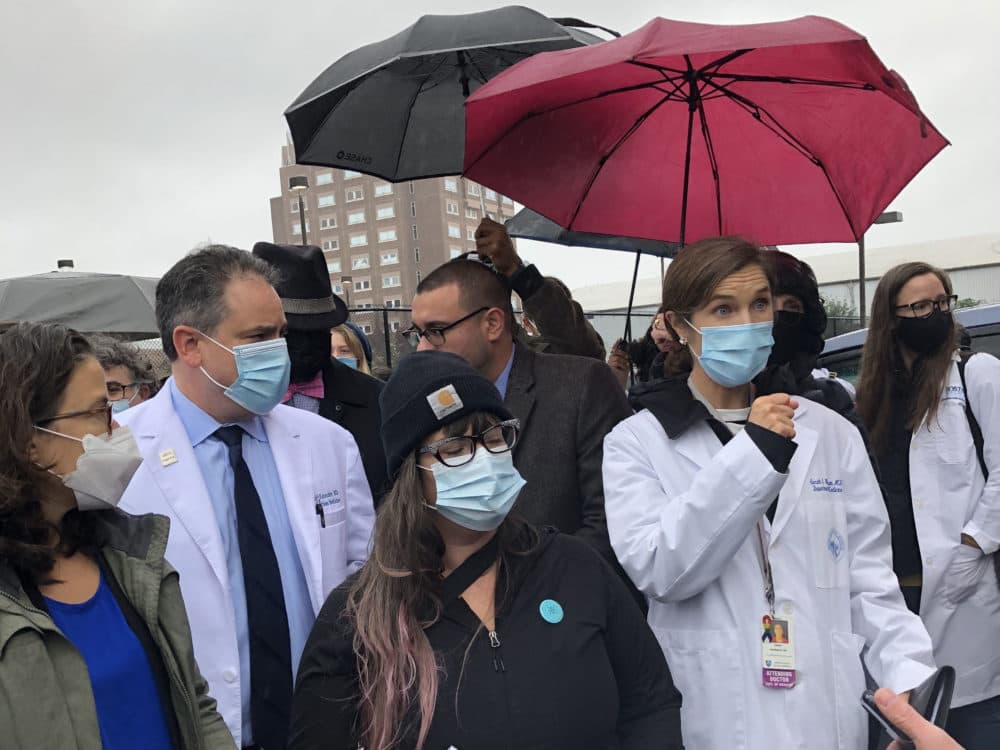Advertisement
Doctors and advocates criticize plan for addiction treatment at Suffolk County Jail

With a new courtroom and treatment facility soon to be operating at the Suffolk County jail, several doctors and political leaders are joining together to oppose the plan.
Suffolk County Sheriff Steve Tompkins is putting in a makeshift courtroom and treatment facility at his jail to deal with those living in a large tent encampment on the nearby streets. The sheriff says he has the room and can help treat the mental health and substance use issues affecting many of those living in the encampment.
The doctors, politicians and activists gathered for a press conference near the jail Wednesday to oppose the sheriff's plan. Among them was Dr. Sarah Wakeman, addiction medicine specialist and primary care doctor at Massachusetts General Hospital and medical director for substance use disorders at Mass General Brigham. She said research shows that forced addiction treatment increases the risk of fatal overdose, and that the city and state should be looking into things such as supportive housing and community outreach.
"Addiction, homelessness, mental illness, poverty, structural barriers, including racism, have resulted in the humanitarian crisis we are seeing today," Wakeman said. "Thankfully, effective interventions for these issues exist, but they do not include displacing community members without meaningful and safer places to voluntarily go, and they don't include compulsory detention and jail based facilities."
Acting Boston Mayor Kim Janey last week issued an executive order to remove the tents. Her order declares a public health emergency in the area often called "Mass. and Cass," the intersection of Massachusetts Avenue and Melnea Cass Boulevard. People often stay in tents there because it's where several providers offer services to help those who are homeless and have mental health or substance use disorders.
Janey has said that people living in the tents will be offered a place to go before the tents are removed. She also said that using a detention center for those with substance use disorders raises "questions and concerns."
Boston City Councilor Ricardo Arroyo, who worked as a public defender, said the resources spent on using the Suffolk County jail to deal with tent encampment should be spent on public health.
"We have spent more on policing this issue than it would have cost to provide housing to every individual on this side of town," Arroyo said. "The systems that were put in place to criminalize this, to put people in jail are still in existence and now the easiest, lowest hanging fruit. What I am asking people to do is to use those resources to recreate a system where we focus on public health, where we create actual pathways that don't involve police cruisers and jail cells so that we can actually get to the root of these causes, because we know that incarceration will not do that."
Advertisement
Tompkins has said that his facility is in the neighborhood and he can house people quickly, before winter sets in and those living on the streets face additional problems. Suffolk County District Attorney Rachael Rollins has said that Tompkins is the only one who has brought forward a viable option to deal with the squalor and violence at the tent encampment.
But State Rep. Ruth Balser said the state hasn't reached out to behavioral health care providers who might be able to offer services in a health care facility, rather than in a correctional setting.
"We are surrounded by some of the greatest medical and behavioral health providers in the world," Balser said. "I know that, if the Baker administration put out that kind of RFP (request for proposals), providers would step forward and offer to do these programs.
"I hear people say everything's on the table. I'm here to say there's one thing that's got to be off the table and that's incarcerating people who are sick."
Balser has sponsored legislation that would prohibit the state from involuntarily committing men to addiction treatment in correctional facilities. The state no longer sends women to jails and prisons for treatment after it was sued. A similar lawsuit involving men is pending.
Tompkins has said he would not commit people to involuntary treatment at his jail, although it's not clear what legal mechanism might be used to send people to treatment. He has said that people would be brought to the court at his jail if they have outstanding criminal warrants and the court will determine what happens from there.
The court could be operating as soon as Monday.
